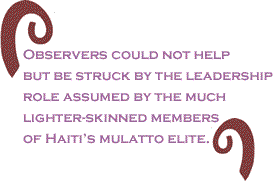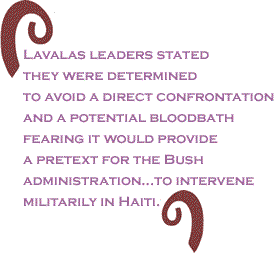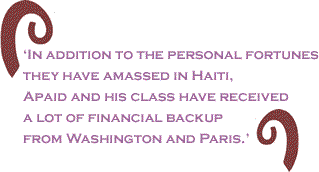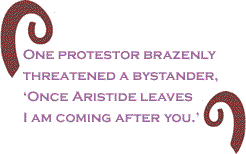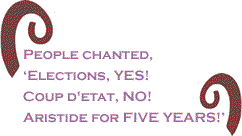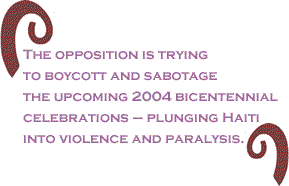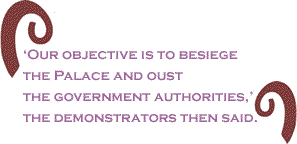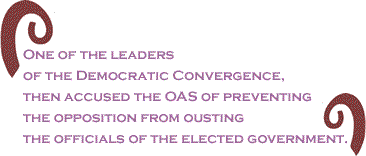
|
|||||||||||||||||||||
|
Haitian Opposition and Corporate Media Press for Regime Change in Haiti In Haiti, as in Venezuela, corporate media act as public relations agents for a political opposition nurtured by the U.S. government. Truth is shamelessly obscured by relentless quotes from opposition figures pursuing American goals of “regime change,” a euphemism for the overthrow of popularly elected governments. With scant resources
but plenty of courage, Below are two links that demonstrate the hopeless bias of corporate shills who pretend to be reporters for Reuters and the Associated Press. The Reuters report is blatant propaganda for the opposition, who are made to seem victims, while the AP dispatch mentions 21 killings since mid-September, but gives the impression that pro-Aristide forces are committing most of the violence. Yet, as Following Pina’s article are reports from a Haitian government press spokesperson and the Haitian Press Agency (AHP) – The Publishers US-Backed Haiti
Opposition Emboldened The Washington-backed opposition Group 184 has emerged as the true leadership behind a recent series of marches and street demonstrations calling for the ouster of Haitian President Jean-Bertrand Aristide. Under the guise of an autonomous student movement against Aristide, members of Group 184 and its ally, the Democratic Convergence, assumed clear leadership roles in the attempts to lay siege to the National Palace in Port-au-Prince on December 11th and 12th. In a bizarre political twist, Lavalas Senators Dany Toussaint and Pierre Prince Sonson, joined former military officer Himmler Rebu and businessman Andre Apaid, of the Democratic Convergence and Group 184 respectively, in calling for Aristide to step down on December 11th. The greatest irony is that this is the same opposition that had accused Toussaint, a former military officer and Lavalas Senator, of having masterminded the assassination of one of Haiti’s most popular journalists, Jean Dominique. Toussaint now alleges that Aristide had set him up to take the fall for the murder. On December 12th Dany Toussaint was quoted as stating that Aristide had only three choices left to him; resignation and exile, prison or death. One Lalavas observer commented, “Toussaint is trying to indemnify himself against a re-opening of the Dominique case and accusations of drug-trafficking leveled against him by the DEA. He thinks that joining the Washington-backed movement against Aristide will provide him with immunity from prosecution. He fears a DEA indictment more then the emergence of the Aristide ‘dictatorship’ he claims compelled him to join the opposition. He was also aware that his political career in Lavalas was coming to an end.” In a now well-established pattern in Haiti, Senator Sonson declared that Aristide and Lavalas militants had threatened his life, giving him no choice but to join the opposition.
Amid heavy police security and a large contingent of international corporate media, the December 11th opposition demonstration saw nearly fifteen thousand people take to the streets calling for President Aristide’s resignation. A number of them were armed with rocks and clubs studded with large metal spikes and nails. Chanting, “Lavalas is a minority and we are the majority,” the demonstrators made their way down to the front of the National Palace where a small contingent of Lavalas supporters had taken up defensive positions behind police erected barricades. Lavalas leaders stated they were determined to avoid a direct confrontation and a potential bloodbath fearing it would provide a pretext for the Bush administration, and its surrogates in the OAS, to intervene militarily in Haiti. The Haitian police were finally forced to fire tear gas and discharge warning shots when the opposition demonstrators attacked a police car. The crowd swung at the police car with spiked clubs before forcing it to drive through the front line of demonstrators and relative safety on the other side of the police line. Minutes later, the police and media were taken by surprise as the same protestors hurled live teargas canisters that had been stolen from the police car in the earlier melee. The police responded by firing several volleys of warning shots into the air and then proceeded to disperse the crowd by force. Class and Color
The demonstrators then headed up to the wealthy suburb of Petion-Ville to reassemble under the leadership of Group 184 and the Democratic Convergence. As they began to descend Route Delmas back towards the palace, observers could not help but be struck by the leadership role assumed by the much lighter-skinned members of Haiti’s mulatto elite, personified by businessman Andre Apaid and his lieutenants. This stood in stark contrast to the swelling numbers of exclusively black faces in the Lavalas counter-demonstration waiting for them in front of the National Palace. While the opposition stated this was an example of the diversity of the movement opposed to President Aristide, many in Lavalas pointed out that it was Apaid’s class who traditionally ruled Haiti by buying the loyalty of the now defunct Haitian military. One Lavalas militant summed it up this way, “In addition to the personal fortunes they have amassed in Haiti, Apaid and his class have received a lot of financial backup from Washington and Paris. This is traditional reactionary politics of the wealthy elite rearing its ugly head once again in Haiti. Since there is no longer a military for sale to the highest bidder, they have now resorted to purchasing demonstrators with black faces to serve as a front for them. There is no difference between these paid mercenaries and opportunists than the black servants in Apaid’s household. When they don’t do as they are told, he will fire them. Just as when he does not do what he is told by Washington, they will fire him. Anyone who mistakes Apaid and his friends as leaders of a democratic movement representing the interests of the black poor majority would do well to re-read their Haitian history. If he were really interested in breaking the apartheid-like system we have in Haiti, he would have helped make things work long ago. He would have supported us when we asked the wealthy elite to pay their taxes to help improve the country. He would have sat at the table with us in sincere dialogue instead of letting Washington use him to block our every move towards changing the conditions of the poor black majority. Antoine Izmery he is not.” (Antoine Izmery was a wealthy mulatto businessman and Lavalas supporter assassinated by paramilitary auxiliaries of the former military known as attachés in September 1994). Campaign of Terror
The opposition demonstration ended before arriving at Haiti’s National Palace but another series of dramatic events was to take place the same evening. As night fell a campaign of terror began that would remain unreported and ignored by the Haitian press and the international corporate media. In two separate but similar incidents, unidentified cars drove through the poor neighborhoods of Cite Soleil and La Saline firing indiscriminately at pedestrians only to disappear into the night. Three people were killed and six wounded in the drive-by campaign of terror. A third incident took place near the National Palace itself, resulting in the cold-blooded assassination of Andre Jan-Marie, the Program Coordinator of the government’s literacy program in Petion-Ville. As Andre got out of his parked car, he was shot once through the heart and once in the head. Palace security rushed to his aid and took him to General Hospital where he was pronounced dead on arrival. Andre Jan-Marie was a member of the development oriented popular organization the Society of Providence and Union for Economic Development in Petion-Ville (SOPUDEP). He was also one of the founders of the SOPUDEP School that serves the poorest children in Petion-Ville and is housed in the former mansion of Duvalier assassin and drug dealer Lionel Wooley. Politics as Theater The opposition had planned a second day of protest on December 12th calling for Aristide’s resignation. By 4 a.m. Lavalas militants began paralyzing the capital with burning barricades at all major intersections. By 8 a.m. more than 30,000 Lavalas supporters had massed to defend the National Palace. A group of about 200 opposition protestors under heavy police escort and led by Andre Apaid, marched from downtown Port au Prince and arrived in Petion-Ville at 11 a.m. Once there they were met by scattered bands of Lavalas supporters who had not received the word to stay away and began throwing rocks. Contrary to claims by the opposition that the Haitian police show deference to Lavalas protestors, the police forced the Lavalas supporters away from Petion-Ville’s central market with teargas as the opposition cheered. This seemed to refute opposition charges that freedom of speech is impossible, and their exaggerated claims that conditions are worse in Haiti than they were following the coup of 1991.
The protestors numbered about three hundred strong as the event took on a carnavalesque and party-like atmosphere. Members of Haiti’s mulatto elite mixed with a few well-known Haitian intellectuals and artists who congratulate each other and give statements to an eager Haitian and international press. Meanwhile, several of the poorer black protesters in the opposition contingent were seen openly threatening known Lavalas members with reprisal once Aristide is forced from office. One protestor brazenly threatened a bystander, “Once Aristide leaves I am coming after you. You better get ready!!” Abandoning all pretense of professionalism, emotional members of Haiti’s press corps were caught provoking people in a passing pickup truck, “Fuck your mother, I know you are a attaché!” (the paramilitary death squads under the Cedras dictatorship). Another taunted, “Come down and get me.” Finally the marchers wandered off in what seemed like an aimless fashion, in search of more encounters. A market woman who had quietly watched the madness commented, “I guess that’s what they mean by democracy.” Read Kevin Pina’s previous reports on the U.S.-backed offensive against the Aristide government: Part I Propaganda War Intensifies Against Haiti, October 30 Part 2 U.S. Corporate Media Distorts Haitian Events, November 6 Part 3 The Bush Administration’s End Game for Haiti Kevin Pina is a documentary filmmaker and freelance journalist who has been working and living in Haiti for the past three years. He has been covering events in Haiti for the past decade and produced a documentary film entitled "Haiti: Harvest of Hope". Mr. Pina is also the Haiti Special Correspondent for the Flashpoints radio program on the Pacifica Network's flagship station KPFA in Berkeley CA. From Michelle
Karshan, Foreign Press Liaison, National Palace
As I said in an earlier email, Thursday night popular organizations
came out to stand vigilant in front of the National Palace,
to guard the people's
choice. Cars circulated Thursday night and Friday morning (again when
pro-government masses were taking to the streets) shooting indiscriminately
into crowds (approx. 10 shot, approx. 7 dead. See below for some
details).
Saying that children need schooling, families need food and
houses to live in, the people said they will not go backwards,
only forwards
in
solidarity. They
asked for respect for the people's choice.
Andre
Jean-Marie, in his late thirties, was the official coordinator
of the literacy program in Petionville. When the literacy
centers noticed that parents were bringing their children with
them to the literacy centers to also learn how to read and write,
Mr. Jean-Marie and others discovered that these very poorest
of the poor families could not access education for their children
(see below). (This brings to mind the IDB loans, one of
which is for expansion of schools, and which still have not been
released to the government of Haiti).
As a result, Mr. Jean-Marie and others founded and oversaw a non-profit elementary school in Petionville (SOPUDEP). The building the school was in was seized by the government and turned over for non-profit use. Just this week a peace and justice delegation from the Church of St. Joan of Arc in Minnesota met with this school and interviewed its director and Mr. Jean-Marie. They have this interview on film. The head of this delegation is Paul Miller. They returned to Minnesota today as scheduled. (Press interested in contact information for Paul Miller can contact me). The Church of St. Joan of Arc described SOPUDEP in their delegation materials prior to arriving in Haiti as follows: "SOPUDEP. A local community group that has started an elementary school in the former residence of a former Ton Ton Macoute member. The school provides education for children whose parents could not afford to send them to school and could not find a place for them in the over crowded classrooms of the already overwhelmed public schools system." From the AHP (Haitian Press Agency) News:
Thousands of students
and members of the opposition engage in violent demonstrations
in Port-au-Prince: one of their objectives is to seize the
National Palace
In the early afternoon, former colonel Rébu, who led the
failed coup d'Etat against the military ruler General
Prosper Avril
in 1989, took the lead of
the demonstration as it passed in front of the office of the Organization
of American States (OAS) in Musseau. |
December
18, 2003 |
||||||||||||
|
||||||||||||
|
|
||||||||||||
| Printer Friendly Version | ||||||||||||
| |
||||||||||||
| |
||||||||||||






















